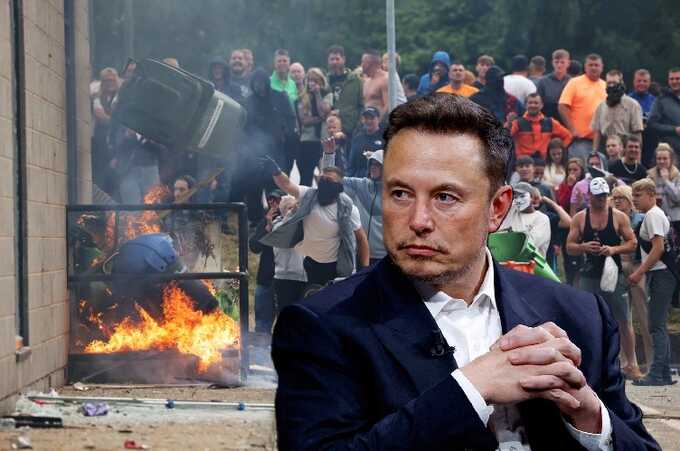Why Elon Musk is taking on Keir Starmer over UK’s far-right riots
From posting about civil war being ‘inevitable’ to tweeting at Keir Starmer about the Rotherham grooming gang scandal – surely Musk knows exactly what he’s doing with his platform, writes James Moore
Ilon Musk is now an expert on London’s ugly riots (apparently). That’s right: the world’s richest man has been airing his views on the violence blighting Britain’s streets; the criminality perpetrated by right-wing thugs who appear to think patriotism involves lighting fires, abusing Muslims and caving in shopfronts before grabbing whatever they can get their hands on.
According to the businessman turned leading authority on world affairs in places he’s probably never visited, it is now “inevitable” that the UK is headed for “civil war”.
He’s also been trolling prime minister Keir Starmer about (among other things) the Rotherham grooming gang scandal, and even implied that communities are treated differently under so-called “two-tier policing”.
Using his own platform to post a series of increasingly bizarre comments, Musk replied to Starmer’s (correct) assertion that what’s been happening “is not protest” but is in fact “pure violence”. Starmer went on to say that he would “not tolerate attacks on mosques or on Muslim communities” who have been on the receiving end.
To which Musk challenged: “Shouldn’t you be concerned about attacks on *all* communities?”
The only thing inevitable was the public backlash as well-meaning figures weighed in, presumably shocked and appalled by the implications. Rory Stewart, for example, replied: “Seriously? Since when have you claimed to understand British communities or British politics? Exactly how many days have you spent with these communities? Does it ever occur to you that this might perhaps be the wrong time to sound off about a subject you know nothing about?”
Stewart is nobody’s fool – and he isn’t wrong. But his intervention nevertheless placed Musk at the centre of the online discourse, which is, I suspect, exactly what Musk wanted in the first place.
Twitter/X – which Musk was more or less forced into buying after he tweeted an ill-advised takeover proposal (he admitted as much in a BBC interview) – has hardly been a stunning success since he took control. In January of this year, Axios revealed that Fidelity, a big US money manager, had written down the value of its stake in the social media company by 71.5 per cent after helping to fund the $44bn (£35bn) takeover.
This was based on Fidelity’s assessment of its holdings – and other shareholders may have other opinions. But no one likes taking write-downs on their investments, least of all the likes of Fidelity. We can thus put some weight behind its views about the performance of Twitter/X on Musk’s watch.
Now ask yourself this: what could turn around what looks like the worst investment decision Musk has made? That’s right – engagement. Controversy gets attention, which gets advertisers, which generates cash. However, there is a business risk – for some are actively put off by simmering social media unrest.
A group of corporations got distinctly queasy last year when Musk decorated an argument with an antisemitic tweet. He has since admitted it was “foolish”, but still blamed the media for stirring up the reaction.
His tweet sparked a boycott of the site, albeit a temporary one in some cases. Musk then seemingly tried to walk back his comment, privately visiting Israel and Auschwitz-Birkenau in the company of conservative commentator Ben Shapiro.
So, he’s not new to spiking racial tensions – only this time round, Muslims are on the receiving end.
What worries me is that, while Musk claims to stand for free speech, he’s doing a fine job of creating material for its enemies – and using the power of his (sadly, as yet unrivalled, at least in terms of popularity) platform to do so.
I find it equally troubling that if the disturbances on the streets amount to terrorism, as has been argued, no one has been keeping an adequate eye on Twitter/X. It’s clearly a breeding ground for racist, far-right viewpoints, as well as facilitating the organisation of the riots.
Yet despite our very real shared fears about Musk and his businesses, we’re all still here on Twitter/X. I hold my hands up.
I can’t help thinking that the writer Kate Mosse had the best response to Musk’s behaviour: “That’s it. Goodbye. @twitter you were great. This is now awful. All my human followers, you can find me instead on Instagram as katemossewriter,” she wrote in what was presumably her final tweet, earlier today.
I confess, the reason I stick around online is that there is an active community of people whom I’ve found far more helpful when I’ve had problems with my medical issues – such as type 1 diabetes – than the NHS has been. Which is desperately sad, I know. But it also shows that there are chinks of light amid the darkness on Twitter/X. Sadly, what Musk has been encouraging could easily snuff them out altogether.
But perhaps his other businesses will solve this. Tesla has started to look like it’s in serious trouble, with a rapidly declining share price. What is Musk’s involvement in the riots really about? The cynics amongst us would say it’s all about cash.
Perhaps Tesla’s cash crisis will divert his attention from British problems, to look at his own...
Read more similar news:
Comments:
comments powered by Disqus

































